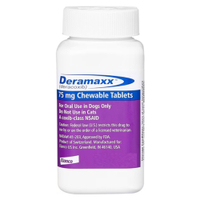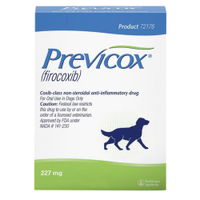Pain meds for dogs: Vet's guide to what to give a dog for pain
Choosing the right pain meds for dogs can help you maximize benefits while minimizing the risk of side effects

When humans feel the onset of pain, it's common to head to the medicine cabinet to alleviate our distress, but what about our pets? Are pain meds for dogs easily available and, if so, what types can you expect to provide our four-legged friends with comfort?
Whether your dog is showing signs of being in pain, had recent surgery or a traumatic injury, working with your vet to obtain appropriate pain medication can help keep your dog as comfortable as possible.
Vets have access to a wide variety of canine pain medications. Each of these drugs functions slightly differently, with differences in their expected benefits and likely side effects.
Don’t get overwhelmed by these options. Instead, read on to learn more about what to give a dog for pain.
What can I give my dog for pain relief?
When your dog is acting uncomfortable, it can be tempting to check your medicine cabinet for something that may help. Resist that temptation!
Human pain medications can have serious negative effects on dogs. Additionally, dog painkillers that are prescribed for one dog under one set of circumstances may be harmful for a different dog or under a different set of circumstances.
If your dog is in pain, contact your veterinarian. Your vet can help determine the underlying cause of your dog’s pain, while also recommending the safest and most effective pain medication for your dog’s circumstances.
Carprofen
Carprofen, also known as Rimadyl, is a commonly-used pain medication in dogs. Carprofen for dogs is a non-steroidal anti-inflammatory drug, or NSAID, which means that it controls both pain and inflammation. It works similarly to how ibuprofen and other NSAIDs work in humans, but with a much lower risk of serious side effects. Ibuprofen should never be given to dogs, because it can cause severe liver damage.
Vets prescribe carprofen in a variety of circumstances, such as an acute injury, post-surgical pain, or chronic arthritis. This drug has been used in dogs since 1997, and vets often reach for this pain medication due its long history of successful use.
Although carprofen is generally well-tolerated, side effects can occur. Watch your dog closely for changes in appetite, nausea or diarrhea. If side effects occur, stop giving the medication and contact your vet. Giving carprofen with a full meal may decrease the risk of side effects.
You’ll need a prescription, but you can buy Rimadyl chewable tablets for your dog via Chewy. The active ingredient is carprofen.
Metacam
Metacam, also known as meloxicam, is another NSAID prescribed for dogs experiencing acute or chronic pain. It has been used in humans since 1977, but was not labeled for use in dogs until 2003. It is typically provided as an oral suspension (liquid), but its generic form can be obtained as tablets.
Meloxicam’s efficacy and potential side effects are similar to carprofen. Just like in the case of humans, though, each dog is an individual. Some dogs respond better to carprofen, while others respond better to meloxicam. It may take some trial and error, and ongoing communication with your veterinarian, to find the most effective medication for your dog.
Metacam Oral Suspension | Chewy
You’ll need a prescription, but Metacam is available from Chewy in a range of sizes and strengths.
Deramaxx for dogs
Deramaxx is an NSAID, like carprofen and meloxicam. It was introduced in 2002, with the primary goal of being more specific in its effects on the body. Unlike carprofen and meloxicam, Deramaxx is designed to only target the specific chemical pathways involved in pain and inflammation.
In theory, Deramaxx’s specificity is accompanied by a lower risk of side effects than meloxicam and carprofen. It’s important to remember, however, that each dog is an individual. Side effects can still occur with Deramaxx, just like with any other medication.
Deramaxx Chewable Tablets | Chewy
You’ll need a prescription, but Deramaxx chewable tablets are available from Chewy in a variety of different stengths and pot sizes.
Previcox
Previcox is an NSAID that was first approved for use in dogs in 2004. It is similar to Deramaxx in its mechanism of action. In theory, it offers more targeted action than carprofen and meloxicam, with a lower risk of side effects. In reality, however, individual effects may vary.
Previcox Chewable Tablets | Chewy
You’ll need a prescription, but you can get Previcox chewable tablets via Chewy in a range of pack sizes and strengths.
Gabapentin
Gabapentin for dogs is used off-label to treat a variety of conditions, including seizures, anxiety, and pain. Its mechanism is not fully understood, but it appears to impact how nerve signals are transmitted in the body. This can reduce the sensation of pain. Gabapentin is especially beneficial in the treatment of neuropathic pain, or pain that involves an issue with the nerves. It is rarely used alone and is often combined with other pain medication.
The most common side effect seen with gabapentin is sedation. Less common side effects include vomiting, diarrhea, weakness, and/or trouble walking.
You’ll need a prescription, but you can get Gabapentin from Chewy in a range of pack sizes and strengths.
Tramadol
Tramadol for dogs was once widely used to control pain. In recent years, however, there has been considerable debate over its benefits in veterinary patients. Scientific studies suggest that it may have limited benefits in most patients. However, many dog owners feel that alleviates their dog’s discomfort, especially when combined with an NSAID.
Side effects of Tramadol may include sedation, vomiting, diarrhea or constipation.
Can dogs have aspirin?
While veterinarians do occasionally prescribe aspirin for dogs, for the treatment of specific medical conditions, aspirin is not commonly recommended as a pain medication.
Aspirin has a far greater risk of causing side effects than NSAIDs that have been developed for safe use in dogs. The most serious risk associated with aspirin is gastrointestinal ulcers, which can lead to significant blood loss.
What human medicine can dogs take?
If your dog is experiencing pain, or any other signs of discomfort or illness, do not attempt to treat the problem with human medication. Dogs’ bodies do not work like ours, and many human medications are potentially toxic to pets.
Contact your vet if your dog is showing signs of pain or illness. Your vet can recommend the best possible treatments for your pet.
In the event that your vet does feel that your dog would benefit from a human medication, they will provide you with appropriate dosing and guidance to ensure that you can give the medication safely, with minimal risk to your dog.
Summary
Vets have access to many different painkillers for dogs, but there is no single “best” medication. Choosing the right pain medication(s) for your dog requires an understanding of the underlying cause of your dog’s pain, combined with an understanding of your dog’s overall health and predisposition to side effects.
Your vet may prescribe a single medication or a combination of medications, depending on your dog’s circumstances. This pain management plan will be created in a way that maximizes your dog’s pain relief, while minimizing the risk of side effects.

Dr. Barnette is a graduate of the University of Florida, where she received both her B.S. in Zoology and her Doctor of Veterinary Medicine (DVM). She has 15 years of clinical experience as a small animal veterinarian, treating dogs, cats, and occasional exotic patients. She now works as a freelance veterinary writer, creating educational content for veterinarians, veterinary team members, and dedicated pet owners.
PetsRadar Newsletter
Get the best advice, tips and top tech for your beloved Pets
Dr. Barnette is a graduate of the University of Florida, where she received both her B.S. in Zoology and her Doctor of Veterinary Medicine (DVM). She has 15 years of clinical experience as a small animal veterinarian, treating dogs, cats, and occasional exotic patients. She now works as a freelance veterinary writer, creating educational content for veterinarians, veterinary team members, and dedicated pet owners. Dr. Barnette lives in southwest Florida with her husband and daughter (plus two cats, a dog, and a rescued dove!) and enjoys kayaking, biking, and hiking. Learn more about Dr. Barnette at www.linkedin.com/in/catherinebarnette.






